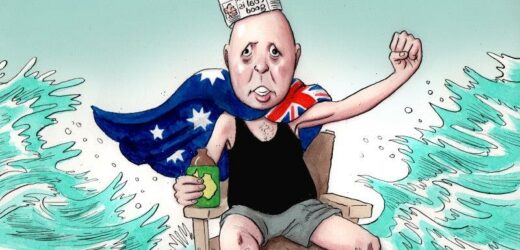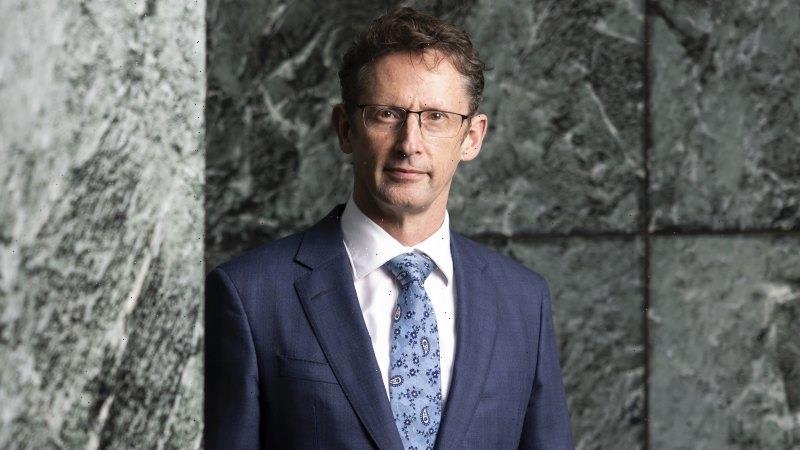Anthony Albanese said it over and over again in the election campaign: “We will end the climate wars.” If so, it’s a unilateral surrender. Because the commanding officer of the opposing army has an entirely different view.
“The Coalition supported strong climate change policy and will in the future, but we won’t support any policy that makes it unaffordable to turn the lights on for families or small businesses,” Peter Dutton tells me. “And we won’t support any policy that drives businesses and jobs and investment overseas because of unreliable power supply” under Labor. The new opposition leader has no intention of ending the climate wars, not if he thinks they might work for him.
Illustration: John ShakespeareCredit:
And the Coalition’s “strong climate change policy” that Dutton speaks of? The Coalition remains committed to the same one that it took to the election last month.
That’s the one with the 2030 emissions cuts of 26 to 28 per cent conceived by Tony Abbott in 2015, before the rest of the developed world pretty much doubled its pledges. Scott Morrison added a commitment to net zero by 2050 but didn’t revise the 2030 targets. Even as Labor promised a more active climate policy.
What is Dutton thinking? Didn’t he notice that the Coalition just got smashed? “One thing is indisputable: climate action is the winner of this election,” trumpeted the Climate Council. The Greens leader, Adam Bandt, called the election a “greenslide”.
All the seats that the Coalition lost went to candidates promising more action on climate change. Among them were six traditional Liberal heartland seats that went to “teal” independents promising climate action as their top priority.
The rock-solid Liberal seats once held by party leaders Robert Menzies, Malcolm Turnbull, Tony Abbott and Julie Bishop fell to “teals”. The Liberals’ deputy state director in Victoria, Tony Barry, described election night as a “teal bath”. The party had lost its base, he said.
A Labor strategist said Dutton seemed to be in denial: “This earthquake ripped through Australian politics, of which we were beneficiaries. There are gaping holes in the highways, the hospitals are on fire, and the Liberals go, ‘Don’t worry, just a minor tremor.’ ”
The political scientist James Walter says “the Liberals’ situation today is as dire as what happened in the early 1940s”. Robert Menzies’ first prime ministership, as leader of the United Australia Party (UAP), ended in 1941 when his party lost faith in him. The UAP went backwards at the next election and later disbanded. Menzies would not return to the prime ministership until he’d founded the Liberal Party, complete with a reconsidered political platform, in 1949. That set the Liberals up for 23 years continuously in office.
Walter says this will be “a 1941 moment” if the Liberals fail to rethink and regroup because “they could do even worse at the next election”. They need to rethink “because they’ve been out of step with the majority for quite some time – climate change was the main one”.
Opposition Leader Peter Dutton.Credit:Dominic Lorrimer
It’s true that the Liberals haven’t yet conducted a full assessment. There could yet be some delayed reaction once they have. But Dutton has some political logic on his side. He makes five key points to colleagues.
First, it’s important not to overreact. The greatest deadweight on the Coalition vote was the unpopularity of Scott Morrison. He was widely disliked and especially so in the “teal” seats among traditional Liberal voters. He had come to be seen as anti-women and pro-corruption. The removal of Morrison as leader should allow the Liberals to lose some of that dead weight and recover some credibility.
Already Dutton has said he’s keen to sit down to discuss the integrity commission bill that the teal independent Helen Haines has drafted.
Second, Dutton makes the point that the Coalition shouldn’t rush to the left in reaction to the election. The Coalition lost votes not only to its left but also to its right. On his preliminary count, some 200,000 voters deserted the Liberals to vote for the teals. At the same time, 700,000 left the Coalition to vote for the smaller parties to the right of the Coalition such as Pauline Hanson’s One Nation and Clive Palmer’s United Australia, says Dutton, citing internal Liberal estimates. The Libs fragmented support on both sides.
Third, Dutton doesn’t want to write off any seat, but he doesn’t think the teal seats that were the party’s past are the party’s future. These seats, such as Menzies’ former seat of Kooyong, Malcolm Turnbull’s Wentworth, Tony Abbott’s Warringah or Julie Bishop’s Curtin, were the home of “aspirational” voters three generations ago.
No longer, Dutton argues. They’ve become so wealthy and established that they’ve moved into the post-materialist phase, he says. The teal independents’ top priorities were climate change, integrity and justice for women. Dutton tells his colleagues the Liberals need to appeal to the new aspirational classes, the middle-income people in the outer metropolitan areas and country regional areas.
He gives this illustration. The voters of Melbourne’s wealthy Kew in the centre of Kooyong want to buy an electric car as a statement, while the people in the outer metro areas want to buy one to save on the high price of petrol, says Dutton. These are the new aspirational voters and they are Dutton’s target audience. He’s spoken publicly about families and small businesses as his key concern, and disdained big business as “estranged” from the Liberals.
“My focus is on small business and our policies will be targeted towards small and micro-businesses,” he said this week at his first press conference as leader. “The single mum who was at home with an online business. A couple who created a business out of COVID. Those who lost jobs and are now working to build their business again, they are the people I will be targeting.
“I want people to understand and to know that, as you move around the shopping strips and see little concrete slab sheds in industrial parks who are exporting $5 million worth of Australian product each year, they are the ones. I want to support them to become bigger businesses.”
James Walter, professor emeritus at Monash University and co-author of a two-volume history of the Australian prime ministership, says that Menzies’ rethinking of liberalism, known famously as his appeal to the “forgotten people”, saw a division between the union movement on the one hand and the wealthy on the other. Menzies’ political target was “the people in the middle who don’t have the resources to fight either”.
In this way, Dutton’s repositioning of the Liberal target audience is redolent of the Menzies rethink.
A post-election analysis by Microburbs, a property and marketing data analytics firm, suggests the Liberals won’t have to chase this audience too hard. They’re already in this territory. The Coalition vote is “trending poor”, says its founder Luke Metcalfe, as reported by Tom Burton in The Australian Financial Review this week.
Based on a close study of individual polling booth results matched against ABS local census data, “the big takeout is we’re seeing a continuation of the trend in the last federal election, where the Coalition’s support base is shifting towards poorer, less educated people born in Australia”, says Metcalfe.
“Rich, educated professionals swung 11 to 12 per cent against the Coalition, while the country’s working poor swung only 3 to 4 per cent against them.”
The danger for Dutton here seems to be in overshooting. The working poor are not necessarily a 100 per cent match with the aspirational class. Or, as James Walter puts it, “it’s alright to say they are the aspirational class but a lot of them are aspiring to be able to afford food to put on the table”.
Fourth, Dutton expects Labor in office will be pulled to the left inevitably. Why? Because, to win passage of legislation through the Senate, the Albanese government won’t have the numbers and will be forced to compromise with the Greens, who will dominate the crossbenches in the upper house.
Finally, Dutton foresees that this will be the wrong direction for the times. The global economic cycle has turned. From disinflation to inflation, from zero per cent interest rates to more normal, and that prices will rise and economic growth suffer. “Whether in the teal seats or in the bush, most people are motivated by the hip pocket,” he says. If they are hurting in the hip pocket, they will blame the government of the day.
And the energy price cycle has turned, too, with big implications for climate change policies. Even if Labor’s policies don’t push energy prices up or force blackouts, it so happens that Albanese has taken office in an accelerating global energy crisis. Prices are soaring. The sheer coincidence of unlucky timing might be enough for the Coalition to exploit and blame Labor anyway.
“If electricity prices rise by 100 per cent, then climate change won’t be as big a priority as it is now,” says Dutton. So Dutton is not planning to move Liberal policy to appeal to where voters are today. Holding it broadly steady on climate change and the economy, he thinks that events will bring voters back to the Liberals tomorrow.
Dutton foresees that the times, as John Howard once said, will suit him. If he’s wrong, he’ll have ceded the future to Anthony Albanese.
Cut through the noise of federal politics with news, views and expert analysis from Jacqueline Maley. Subscribers can sign up to our weekly Inside Politics newsletter here.
Most Viewed in Politics
From our partners
Source: Read Full Article




